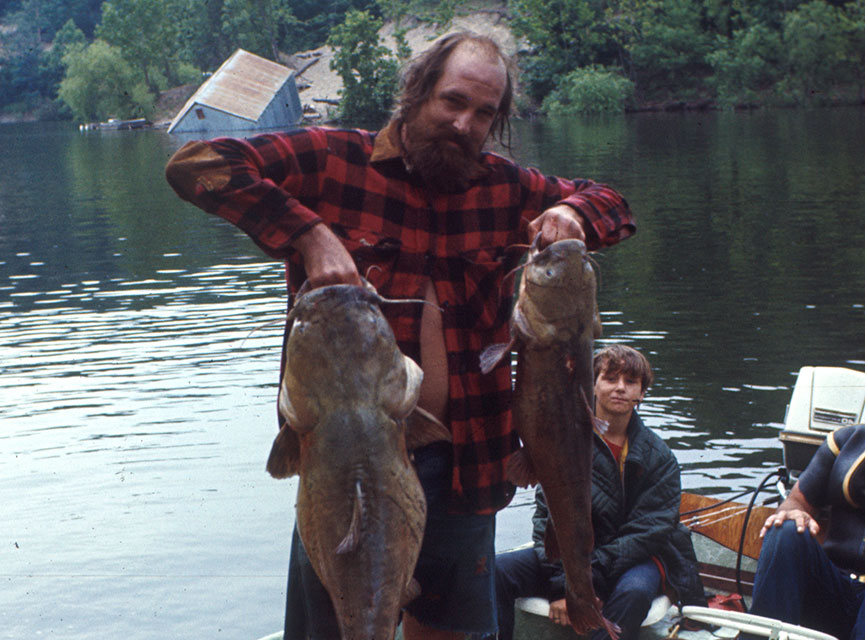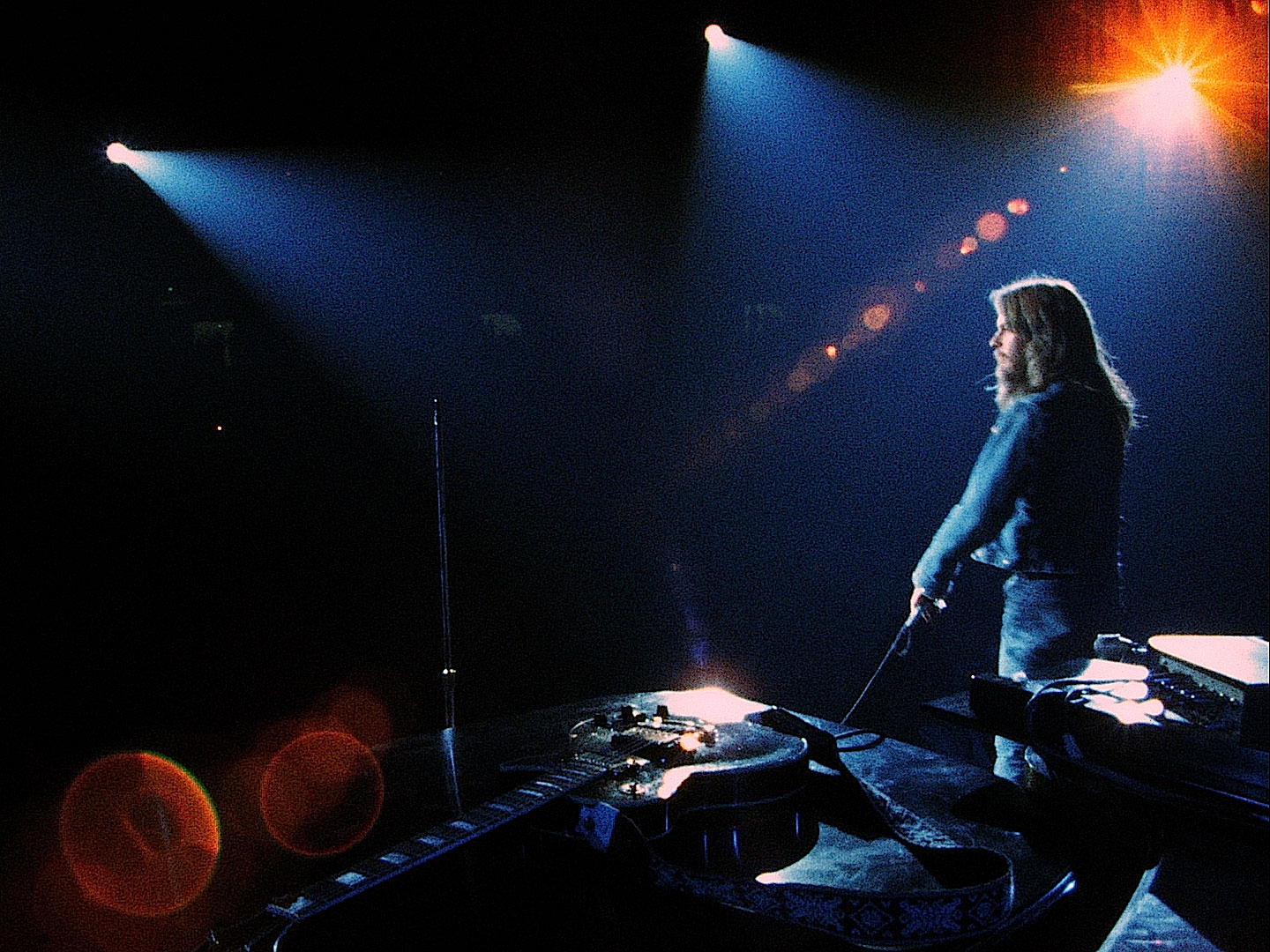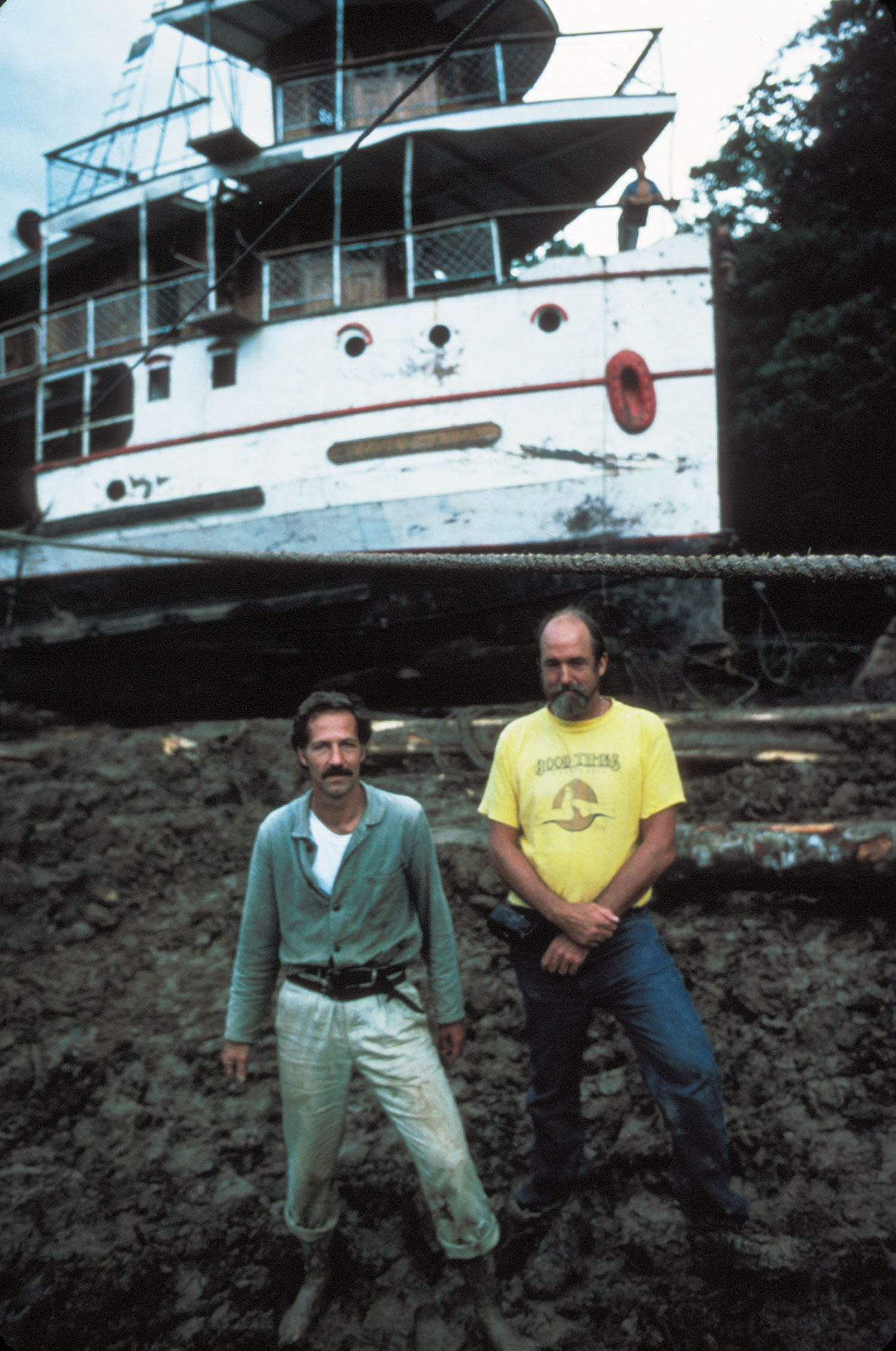LES BLANK
Filmography
|
The embodiment of the spirit of independent filmmaking, Les Blank (1935-2013) left an indelible body of work full of lyricism, food, music and idiosyncratic characters. His intimate portraits of unexposed pockets of American life brought him world-renown - colourful glimses of rich cultures often centred around mouth-watering food and foot-stamping rhythms from Cajun, Mexican, Polish, Hawaiian, and Serbian-American communities. Other subjects include Texas blues men, Appalachian fiddlers, Afro-Cuban drummers, gap-toothed women, and garlic - all caught by Blank's compassionate lens.

Les Blank with catfish haul, on location in Oklahoma
His most famous work is Burden of Dreams (1982), a remarkable record of the fraught film production of Werner Herzog's Fitzcarraldo, shot in South America. A classic 'making of' film that is so much more, and sometimes cited as a superior experience to Herzog's film.
Blank's talented team over the years included Skip Gerson, Maureen Gosling, Chris Simon, Susan Kell, Marianne Yusavage, David Silberberg, son Harrod Blank, and Gina Leibrecht.
In recent years his films have been restored for a new audience to appreciate, including a lavish Criterion Blu-ray boxset in the US and the resurrection of a major film on Leon Russell, A Poem is a Naked Person, unseen for years (made in 1974 and finally released in 2015).

Leon Russell in A Poem is a Naked Person
LES BLANK FILMOGRAPHY

Werner Herzog and Les Blank on the set of Fitzcarraldo, the subject of Blank's Burden of Dreams
Here Comes Everybody (1960)
Running Around Like A Chicken With Its Head Cut Off (1960)
Six Short Films of Les Blank (1960/1985)
Strike! (1961)
And Freedom Came?! (1962)
Pleasure Faire (1963/1964)
Dizzy Gillespie (1964)
Christopher Tree (1967)
God Respects Us When We Work, But Loves Us When We Dance (1968)
A time-capsule report on a specific high point of the hippie counterculture movement of the Sixties, seen at the Los Angles 1967 Easter Sunday 'Love-In'. It is a finely shot panaroama of the action as well as the more meditative moments.
The Blues Accordin’ to Lightnin’ Hopkins (1968)
In his own words and his 'own' music, Texas bluesman Lightnin' Hopkins reveals the inspiration for his blues.
He sings, jives and ponders. He boogies at an outdoor barbecue and a black rodeo and takes us with him on a visit to his boyhood home of Centerville in Texas. The film reaches past the impish bluesman into the Blues, into the red-clay Texas, into hard times, into blackness and the senses.
Mister Charlie (1969)
The Arch (1969)
The Sun’s Gonna Shine (1969)
Chicken Real (1970)
An industrial short made for the world's second largest poultry producer, this film incorporates some subversive satire in its promotion of the modern assembly-line approach to mass-manufactured food. The music was recorded in North Carolina - by a group playng all the chicken songs they knew!
A Well Spent Life (1971)
Les Bank Blank described the 75-year-old black philosopher-songster Mance Lipscomb, as 'the closets thing to a Christ figure I have ever seen'. The film looks into the thoughts and music of the man and also provides a revealing glimpse of a black farming community.
Spend It All (1971)
A perceptive, lusty and lyrical documentary of some true American originals, the Cajuns of South-west Louisiana, who still retain the language, camaraderie and old world spirit of their French-speaking Acadian ancestors. The film captures the intense bravado and vitality of their lives.
Dry Wood (1973)
This is the first part of a two-part documentary on the life and music of the French-speaking blacks in south-west Louisiana's Cajun country. Dry Wood features the music of 'Bois Sec' Ardoin, his sons and Canray Fontenot. Theirs is an older, rural style of Cajun music which, in the film, weaves together incidents in the lives of the Fontenot and Ardoin families. The highlights include a rollicking country Mardi Gras, work in the rice fields, a 'Men Only' supper and a hog-butchering party that takes the hog from kill to sausage.
Hot Pepper (1973)
Hot Pepper is the second part of Blank's Cajun documentary and plunges the viewer deep into the music of Clifton Chenier andits sources in rural and urban Louisiana. The great French accordionist mixes rock and blues in his unique version of 'Zydeco' music , a pulsating combination of Cajun French with African undertones. Clifton belts it out in sweaty music halls and the film winds his music through the bayous and byways of the countryside and into the streets and homes of his people.
Chulas Fronteras (1976/2018)
A magnificent introduction to the most exciting Nortena musicians working today: Los Algres de Teran, Lydia Mendosa, Flaco Jimenez and others. The Mexican- Americans live on the Texan side of the border. To the south lies Mexico and poverty; to the north is America, hostility and little hope of deliverence. They belong to neither area and migrate from state to state with the seasons for work in the fields. Blank makes clear the role that the Chicago music has in redeeming their lives by giving utterance to a collective pain. This music and the spirit of the people is seen embodied in their strong familiy life and sheer enjoyment of domestic rituals.
Always for Pleasure (1978)
A look at Mardi Gras in New Orleans and the myriad musical traditions supporting the annual celebrations. The ritual traditions of the jazz funeral or blacks masquerading as 'Indians' are some of the rich offerings of the street pageantry that show the cultural history of the city. The film captures the intense and intricate social competition symbolised by the dance. Among those appearing in the film are the Wild Tchoupitoulas, Professor Longhair and Kid Thomas Valentine.
Del Mero Corazon (1979/2018)
This is a lyrical journey through the heart of Chicago culture, as reflected in the love songs of the Tex-Mex Nortena music tradition, Love songs are the poetry of daily life - a poetry of passion and death, hurt and humour, pleasures and torn desire. In the film these songs travel from intimate family gatherings to community dance halls; they are passed along changed into new songs but always sung from the heart. Artists appearing include Leo Arza, Chavela Ortiz, Brown Express, Little Joe and la Familia.
Werner Herzog Eats His Shoe (1979)
Garlic is as Good as Ten Mothers (1980)
Burden of Dreams (1982)
Sprout Wings and Fly (1983)
In Heaven There Is No Beer? (1984)
Cigarette Blues (1985)
Huey Lewis And The News: Be-Fore! (1986)
Gap-Toothed Women (1987)
Ziveli! Medicine for the Heart (1987)
A Blank Buffet (1988)
Ry Cooder Group ’88 in Santa Cruz (1988)
J’ai Été Au Bal / I Went to the Dance (1989/2021)
The Best of Blank (1989)
Yum, Yum, Yum! A Taste of Cajun and Creole Cooking (1990)
Innocents Abroad (1991)
Julie: Old Time Tales of the Blue Ridge (1991)
Marc & Ann (1991)
Puamana (1991)
My Old Fiddle: A Visit with Tommy Jarrell in the Blue Ridge (1994)
Roots of Rhythm (1994)
The Maestro: King of the Cowboy ARTISTS (1994)
Sworn to the Drum: A Tribute to Francisco Aguabella (1995)
The Maestro Rides Again! (2005)
All In This Tea (2007)
How to Smell a Rose: A Visit with Ricky Leacock in Normandy (2014)
A Poem Is A Naked Person (1974/2015)
Les Blank’s Student Films (2015)
Thailand Moment (1967/2015)
(In progress) – Butch Anthony Film
|

